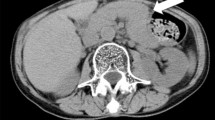Summary
Two patients without risk factors or a prior history of pancreatitis developed acute pancreatitis soon after initiating pentamidine isethionate therapy forPneumocystis carinii pneumonia associated with the acquired immunodeficiency syndrome. In both patients the pancreatitis improved following medication cessation. One patient did not redevelop pancreatitis when he subsequently received inhaled pentamidine. Review of the literature revealed five previously reported cases of this drug reaction. Pentamidine-associated pancreatitis appears to develop within three weeks of initiating therapy and after receiving more than 1 g in cumulative dosage. Glucose abnormalities, renal insufficiency, and nonspecific abdominal pain may be early warning signs of pentamidine-associated pancreatitis.
Similar content being viewed by others
References
King H, Lourie EM, York W: Studies in chemotherapy XIX: further report on new trypanocidal substances. Ann Trop Med Parasital 32:177–192, 1938
Drugs for parasitic infections. Med Lett Drugs Ther 26:27–34, 1984
WHO Expert Committee on Leishmaniasis. The Leishmaniasis Technical Report Series 701. Geneva, World Health Organization, 1984
Pearson RD, Hewlett EL: Pentamidine for the treatment ofPneumocytis carinii pneumonia and other protozoal diseases. Ann Intern Med 103:782–786, 1985
Siegal SE, Wolff LJ, Boehner RL, et al: Treatment ofPneumocystis carinii pneumonitis: A comparative trial of sulfamethoxazole-trimethoprim versus pentamidine in pediatric patients with cancer: Report from the Children's Cancer Study. Am J Dis Child 138:1051–1054, 1984
Wharton JM, Coleman DL, Wofsy CB, et al: Trimethoprimsulfamethoxazole or pentamidine forPneumocystis carinii pneumonia in the acquired immunodeficiency syndrome—a prospective randomized trial. Ann Intern Med 105:37–44, 1986
Centers for Disease Control. Human immunodeficiency virus infection in the United States: a review of current knowledge. MMWR 36:1–20, 1987
Brivet F, Coffin B, Bedassa P, et al: Pancreatic lesions in AIDS. Lancet 2:570–571, 1987
Bricaire F, Mardre C, Zoubi D, et al: Pancreatic disturbances and AIDS: An anatomopathological study.In Proceedings of the Third International Conference on AIDS, June 1987. Washington: International Conference on AIDS, 1987, p 187 (abstract)
Zazzo JF, Pichon F, Regnier B: HIV and the pancreas. Lancet: 1212–1213, 1987
Mallory A, Kern F: Drug induced pancreatitis: A critical review. Gastroenterology 78:813–820, 1980
Johnston DH, Cornish AL: Acute pancreatitis in patients receiving chlorothiazide. JAMA 170:2054–2056, 1959
Haber CJ, Meltzer SJ, Present DH, et al: Nature and course of pancreatitis caused by 6-mercaptopurine in the treatment of inflammatory bowel disease. Gastroenterology 91:982–986, 1986
Rominger JM, Gutierrez JG, Curtis D, et al: Methyldopainduced pancreatitis. Am J Dig Dis 23:756–758, 1978
Batalden PB, Van Dyne BJ, Cloyd J: Pancreatitis associated with valproic acid. Pediatrics 64:520–522, 1979
Murray JF, Felton CP, Garay SM, et al: Pulmonary complications of the acquired immunodeficiency syndrome: Report of a National Heart, Lung and Blood Institute Workshop. N Engl J Med 310:1682–1688, 1984
Antonow DR: Acute pancreatitis associated with trimethoprim-sulfamethoxazole. Ann Intern Med 104:363–365, 1986
Bouchard P, Sai P, Reach G, et al: Diabetes mellitus following pentamidine-induced hypoglycemia in humans. Diabetes 31:40–45, 1982
Osei K, Falko JM, Nelson KP, Stephens R: Diabetogenic effect of pentamidine;in vitro andin vivo studies in a patient with malignant insulinoma. Am J Med 77:41–46, 1984
Murphey SA, Josephs AS: Acute pancreatitis associated with pentamidine therapy. Arch Intern Med 141:56–58, 1981
Salmeron S, Petitpretz P, Katlama C, et al: Pentamidine and pancreatitis. Ann Intern Med 105:140–141, 1986
Zuger A, Wolf BZ, El-Sadr W, et al: Pentamidine-associated fatal acute pancreatitis. JAMA 256:2383–2385, 1986
Conte JE, Hollander H, Golden JA: Inhaled or reduced-dose intravenous pentamidine forPneumocystis carinii pneumonia: A pilot study. Ann Intern Med 107:495–498, 1987
Author information
Authors and Affiliations
Rights and permissions
About this article
Cite this article
Schwartz, M.S., Cappell, M.S. Pentamidine-associated pancreatitis. Digest Dis Sci 34, 1617–1620 (1989). https://doi.org/10.1007/BF01537122
Received:
Accepted:
Issue Date:
DOI: https://doi.org/10.1007/BF01537122




